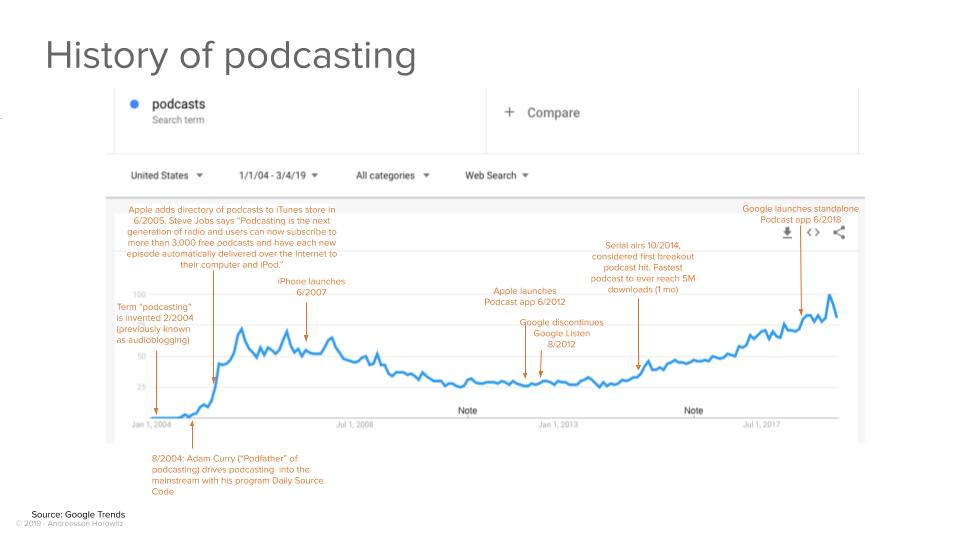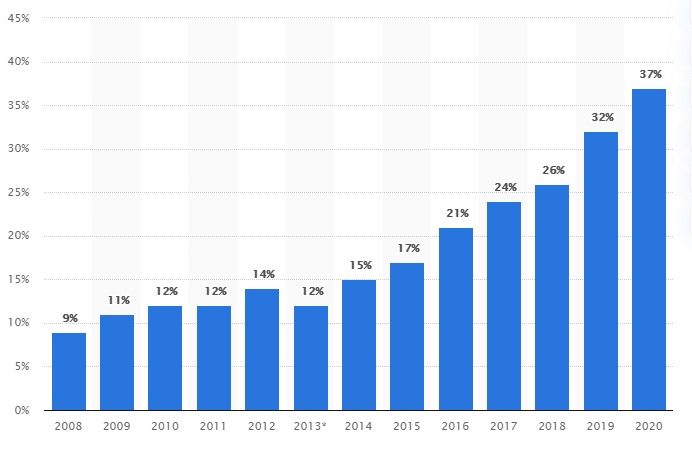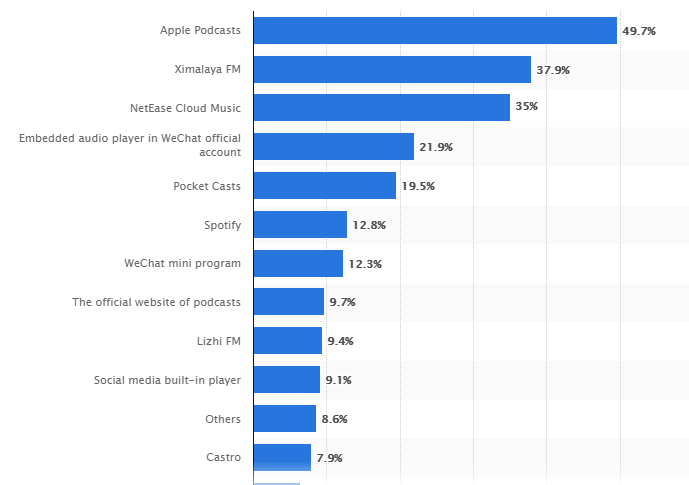Mapping Indonesia's Position in the Growth of the Global Podcast Industry
The podcast industry in China has many business models, while the podcast industry in the United States relies mostly on advertising
Among the creative content industries that have skyrocketed over the past few years, one of the most rising stars is podcast audio content. A research entitled "Global Podcasting Market by Genre, by Formats, by Region, Industry Analysis and Forecast, 2020 - 2026" states that the size of the global podcast market is expected to reach $41,8 billion in 2026, experienced a market growth of 24,6% CAGR during the period.
Simply, podcast is a digital audio file that users can download — or in some applications, streaming — and listen over the internet, usually available as a series that listeners can easily accept. Though podcast vary widely in content, format, production value, style, and length, all distributed via RSS, or Really Simple Syndication, the standard format used to publish content. In the case of podcasts, RSS contains all the metadata, artwork, and content of the show.
According to some sources, podcasting stems from blogposting developed by oDavid Winer and Christopher Lydon in the early 2000s. Winer created an RSS channel that compiles audio recordings of interviews between former NPR journalist Christopher Lydon and technologists and politicians. In the same period, Adam Curry introduced the Daily Source Code program which was then distributed via the iPod.
This attracted the interest of journalist Ben Hammersley who then discussed public interest regarding the widespread distribution of audio content and accidentally discovered the term podcasting [an abbreviation for iPod and broadcasting]. In its early days, this market focused on a niche audience or niche and individual topics -- like cable television or blogs -- are different from radio which is aimed at a mass audience, so it must have content with broad appeal.
 Source: Website Andreessen Horowitz
Source: Website Andreessen HorowitzIn 2005, Apple released version 4.9 which supported podcast distribution across all of its platforms. At the time, Steve Jobs said, "Podcasting is the next generation of radio, and users can now subscribe to more than 3.000 free Podcasts and have each new episode automatically delivered over the Internet to their computers and iPods."
Apple Podcasts played an important role in the development of the industry and continues to dominate the listening app charts. However, its market share has fallen in recent years, from more than 80% to 63%. This seems natural considering that more and more platforms are starting to accommodate podcast distribution, such as Google Podcasts and Spotify.
Nowadays, people are spending more and more time listening podcast. According to the portal's compilation of data and statistics, The report of Statista, 37 percent of adults in the United States (US) have listened podcast, this figure has more than tripled over the past decade.

Born and developed in the US market, the popularity of podcasts spread quickly throughout the world. The podcast industry in China is said to have 23x bigger from America for one main reason: Podcasts in China mostly have a paid subscription business model, while podcasts in America are almost all free and ad-supported only.
As a country with industry podcast which is still considered a "baby", which mecca would be suitable for the Indonesian market?
Podcast business model
Reporting from HBR, a good business model must be able to answer questions such as 'Who are the customers? And what value does it offer?' Then it also has to answer a fundamental question: How do we make money in this business? What is the underlying economic logic that explains how companies can provide value to customers at appropriate costs?”
In a thread on Twitter, Co-Founder and partner of Village Global, a US-based early stage VC, Erik Torenberg explains interesting facts regarding monetization in the industry podcast. Erik revealed that some of the reasons this industry is still having difficulty finding sources of income are because monetization cannot be done on the largest distribution channels [Apple], long tail marketing [long-tail marketing] which is not sufficient, as well as complete data that is not yet available and "targeting" tools that are not yet sophisticated.
[embed]https://twitter.com/eriktorenberg/status/1251686848201502720[/embed]
The current monetization of the podcast business is like the internet in its early days, still new and not yet stable. As the number of listeners increases, podcasts can start to generate revenue through incoming advertising. However, sometimes advertising alone is not enough. In his thread, Erik also conveyed a description of potential business models that could be learned from China.
The first and still the main thing is advertising or sponsorship. Even though it is considered effective and unique (because it can target almost unlimited demographics and geographies), sometimes advertising alone is not enough to meet production needs.
Besides, there are donations which allows content creators to earn revenue through donations via third parties from their listeners. One of the familiar platforms used in Indonesia, Anchor, allows listeners to make donations to content creators of up to $10/month.
Then there is subscription and a la carte purchases. This premium subscription model is popular in China. One consumer audio platform that has reached unicorn status, Ximalaya, has a $3 per month subscription feature that allows users to access more than 4000 e-books and more than 300 premium audio courses or podcasts. Audio content is also available a la carte, starting at $0,03 per episode, or from $10 to $45 for paid audio courses.
According to the author's observations, the first two schemes (advertising and subscription) are the concepts most likely to be implemented by a content creator network without an independent platform.
An ecosystem that is starting to mature
Over the past five years, dedicated audio applications in China have grown rapidly. In fact, online audio market users grew more than 22% in China in 2018, increasing faster than video or reading apps. A look at China can illustrate potential business models — in part through adopting an audio-centric approach rather than following suit definition podcasting limited.
Ximalaya is known already owns 70 percent of the audiobook rights to best-selling titles in China and recently made an investment in San Francisco-based Himalaya media. Supported by Tencent, Ximalaya has built an audio-based platform and community, Ximalaya FM, with an average of 250 million monthly users. 146 million of them listen to the company's audio content via internet-of-things (IoT) devices and other third-party devices.
As of March 2020, Ximalaya managed to rank second after Apple as the most frequently used platform for listening to podcasts in China, ahead of Spotify which was ranked 6th.

In Indonesia, this industry is gaining popularity when Spotify opens a special channel that makes it easier for anyone to upload podcast content. Several familiar names such as Rapot, Podkesmas, or Rintik Sedu have been perched in the most popular podcast category on Spotify.
Podcast As the creative industry has developed in such a way, content variety and flexibility have become two big reasons why consumers listen to this digital-based audio content.
One of the local podcast platforms that is also competing is Inspigo or Inspiration on the Go recently reported has been injected with funds by Telkomsel Innovation Partners (TMI). The following is an overview of several platforms that are often used to listen to podcasts in Indonesia and their monetization strategies.
| Application | Services | Monetization |
| Spotify | Music and podcast distribution | Advertising and premium Spotify access starts from IDR 2,500 per day to IDR 79,000 per month |
| Apple Podcast | Podcast distribution | Free (iOS users only) |
| Soundcloud | Music and podcast distribution | Ads and premium access start from IDR 36,000 to IDR 174,000 per month |
| Pocket Casts | Podcast recording and distribution | Premium access starts from IDR 14,000 per month |
| Google Podcast | Podcast distribution | Free |
| Anchor | Podcast recording and distribution | Free |
| NOISE | Distribution of music, podcasts, radio and audiobooks | Free |
| Inspigo | Distribution of podcasts, audio playbooks | Premium access starts from IDR 10,000 per 7 days to IDR 300,000 per 12 months |
Local players' views
The increasingly visible growth of the podcast business has also attracted the interest of local and global investors. However, considering the monetization challenges, the question is whether startups can build the right path to becoming a sustainable business?
Aryo Ariotedjo, Co-Managing Partner of Absolute Confidence, who has entered as seed investors di Podkesmas, revealed, "With the rise of content in Indonesia such as YouTube, podcasts are an industry that has only developed in the last 2 years, just like YouTube in 2014. Becoming a supporter of podcasters in the early days of the development of this industry, can be able to boost talents These people become professionals and can monetize better and create content that they are looking for based on existing data (data driven content creation). "
In Indonesia itself, the podcast service that has been confident in its business model from the start is Inspigo. They build content with the goal of company (employee) consumption. Meanwhile, other podcasters are still looking for popularity and loyal listeners on platforms such as Spotify and Apple Podcasts.
CIO Mugi Reksa Abadi Group and also angel investors Michael Tampi expressed his optimism by saying, "We are still in the stage of finding the most appropriate format, but the winners are already starting to emerge."
Sign up for our
newsletter
 Premium
Premium
